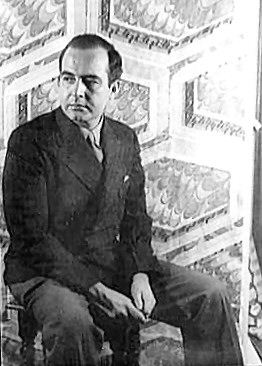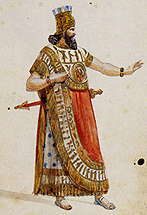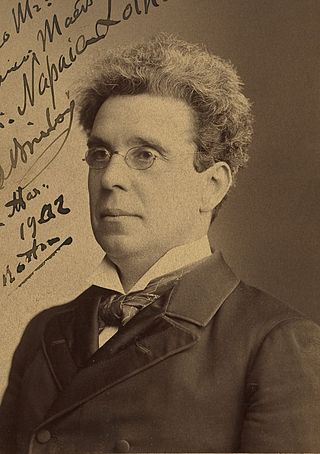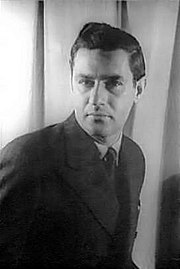
Samuel Osmond Barber II was an American composer, pianist, conductor, baritone, and music educator, and one of the most celebrated composers of the 20th century. The music critic Donal Henahan said, "Probably no other American composer has ever enjoyed such early, such persistent and such long-lasting acclaim." Principally influenced by nine years' composition studies with Rosario Scalero at the Curtis Institute and more than 25 years' study with his uncle, the composer Sidney Homer, Barber's music usually eschewed the experimental trends of musical modernism in favor of traditional 19th-century harmonic language and formal structure embracing lyricism and emotional expression. However, he adopted elements of modernism after 1940 in some of his compositions, such as an increased use of dissonance and chromaticism in the Cello Concerto (1945) and Medea's Dance of Vengeance (1955); and the use of tonal ambiguity and a narrow use of serialism in his Piano Sonata (1949), Prayers of Kierkegaard (1954), and Nocturne (1959).

Samson and Delilah, Op. 47, is a grand opera in three acts and four scenes by Camille Saint-Saëns to a French libretto by Ferdinand Lemaire. It was first performed in Weimar at the Grossherzogliches Theater on 2 December 1877 in a German translation.

Vanessa is an American opera in three acts by Samuel Barber, opus 32, with an original English libretto by Gian Carlo Menotti. It was composed in 1956–1957 and was first performed at the Metropolitan Opera in New York City on January 15, 1958 under the baton of Dimitri Mitropoulos in a production designed by Cecil Beaton and directed by Menotti. Barber revised the opera in 1964, reducing the four acts to the three-act version most commonly performed today.

Nabucco is an Italian-language opera in four acts composed in 1841 by Giuseppe Verdi to an Italian libretto by Temistocle Solera. The libretto is based on the biblical books of 2 Kings, Jeremiah, Lamentations, and Daniel, and on the 1836 play by Auguste Anicet-Bourgeois and Francis Cornu. However, Antonio Cortese's ballet adaptation of the play, given at La Scala in 1836, was a more important source for Solera than the play itself. Under its original name of Nabucodonosor, the opera was first performed at La Scala in Milan on 9 March 1842.

Amahl and the Night Visitors is an opera in one act by Gian Carlo Menotti with an original English libretto by the composer. It was commissioned by NBC and first performed by the NBC Opera Theatre on December 24, 1951, in New York City at NBC Studio 8H in Rockefeller Center, where it was broadcast live on television from that venue as the debut production of the Hallmark Hall of Fame. It was the first opera specifically composed for television in the United States.

The Consul is an opera in three acts with music and libretto by Gian Carlo Menotti, his first full-length opera.
Stanley Walker Hollingsworth was an American composer and teacher. He was a student of composer Darius Milhaud from 1944–46, and of Gian Carlo Menotti from 1948–50. As a composer he is probably best known for his operatic trilogy of children's stories: "The Mother", "The Selfish Giant", and "Harrison Loved his Umbrella".
Lee Henry Hoiby was an American composer and classical pianist. Best known as a composer of operas and songs, he was a disciple of composer Gian Carlo Menotti. Like Menotti, his works championed lyricism at a time when such compositions were deemed old fashioned. His most well known work is his setting of Tennessee Williams's Summer and Smoke, which premiered at the St Paul Opera in 1971.

Antony and Cleopatra, Op. 40, is an opera in three acts by American composer Samuel Barber. The libretto was prepared by Franco Zeffirelli. It was based on the play Antony and Cleopatra by William Shakespeare and made use of Shakespeare's language exclusively.

Alberto Bimboni (1882–1960) was an Italian-born American composer and conductor. He is remembered today, if at all, for his opera Winona; consequently, he is sometimes grouped with other composers of the Indianist movement in American music.

Amelia al ballo is a one-act opera buffa by Gian Carlo Menotti, who set his own Italian libretto. Composed during 1936 when Menotti was in his mid-twenties, it was the composer's first mature opera and first critical success. The opera recounts a series of farcical events as a young Italian socialite overcomes obstacles to her attendance at the first ball of the season.

The Last Savage is an opera in three acts by composer Gian Carlo Menotti. Menotti wrote his own libretto, originally in the Italian language. The opera was translated into French by Jean-Pierre Marty for the work's first (private) performance at the Opéra-Comique in Paris on 21 October 1963, followed the next day by the public premiere. George Mead translated the work into English for the opera's American premiere at the Metropolitan Opera the following year.

Griffelkin is an opera by Lukas Foss with a libretto by Alastair Reid. The opera was first performed on November 6, 1955, in a nationwide telecast by the NBC Opera Theatre.

The Saint of Bleecker Street is an opera in three acts by Gian Carlo Menotti to an original English libretto by the composer. It was first performed at the Broadway Theatre in New York City on December 27, 1954. David Poleri and Davis Cunningham alternated in the role of Michele, and Thomas Schippers conducted. It ran for 92 consecutive performances.

The Unicorn, the Gorgon and the Manticore or The Three Sundays of a Poet is a "madrigal fable" for chorus, ten dancers and nine instruments with music and original libretto by Gian Carlo Menotti. Based on the 16th-century Italian madrigal comedy genre, it consists of a prologue and 12 madrigals which tell a continuous story, interspersed with six musical interludes. The unicorn, gorgon, and manticore in the title are allegories for three stages in the life of the story's protagonist, a strange poet who keeps the mythical creatures as pets. The work premiered in Washington D.C. at the Library of Congress Coolidge Auditorium on October 19, 1956.

Martin's Lie is a chamber opera in one act with music and an English language libretto by Gian Carlo Menotti. Commissioned by CBS, it was Menotti's third opera for television after Amahl and the Night Visitors and Labyrinth. Although not initially conceived as a work for the stage, the opera premiered in a live theatrical performance on 3 June 1964 at the Bristol Cathedral for the opening of the 17th annual Bath International Music Festival. The opera was subsequently filmed with the same cast for television under the direction of Kirk Browning with Julie Andrews serving as host. The production used sets and costumes by designer Anthony Powell, and was broadcast nationally by CBS for the opera's United States television premiere on 30 May 1965.

La Loca(The Madwoman), also known as Juana la Loca(Crazy Joanna), is an opera by Gian Carlo Menotti, composed in 1979. It is a romantic drama about the life of Joanna of Castile (1479–1555). It was written as a vehicle for soprano Beverly Sills and received its premiere on June 3, 1979, at the San Diego Opera, followed by the New York City Opera. Critical response was largely negative, so Menotti completely reworked it. The revised version premiered in 1982 at the Festival of Two Worlds in Spoleto, Italy. The American premiere of the revised version took place at the Spoleto Festival USA in Charleston, South Carolina, on June 1, 1984.

Gian Carlo Menotti was an Italian composer, librettist, director, and playwright who is primarily known for his output of 25 operas. Although he often referred to himself as an American composer, he kept his Italian citizenship. One of the most frequently performed opera composers of the 20th century, his most successful works were written in the 1940s and 1950s. Highly influenced by Giacomo Puccini and Modest Mussorgsky, Menotti further developed the verismo tradition of opera in the post-World War II era. Rejecting atonality and the aesthetic of the Second Viennese School, Menotti's music is characterized by expressive lyricism which carefully sets language to natural rhythms in ways that highlight textual meaning and underscore dramatic intent.

The Most Important Man is an opera in three acts with music and libretto by Gian Carlo Menotti. Commissioned by Julius Rudel for the New York City Opera, the work premiered at Lincoln Center in 1971 in a production directed by Menotti with sets designed by Oliver Smith and costumes by Frank Thompson. An opera focusing on racial tensions in Africa with a central black hero, the work was poorly received by most critics. However, Menotti personally believed that this was one of his best operas on par with The Consul and The Saint of Bleecker Street. The work's first European performance was at the Teatro Lirico Giuseppe Verdi in Trieste, Italy, on January 17, 1972. The opera uses Menotti's characteristic lyrical style which is inspired by Puccini and the Italian verismo opera tradition. In this work he infuses African percussion and rhythms, much in the way Puccini infused Asian inspired melodies and musical practices into his opera Madama Butterfly.









